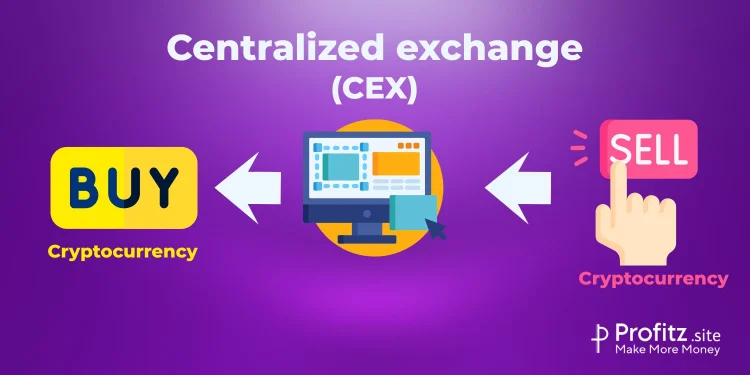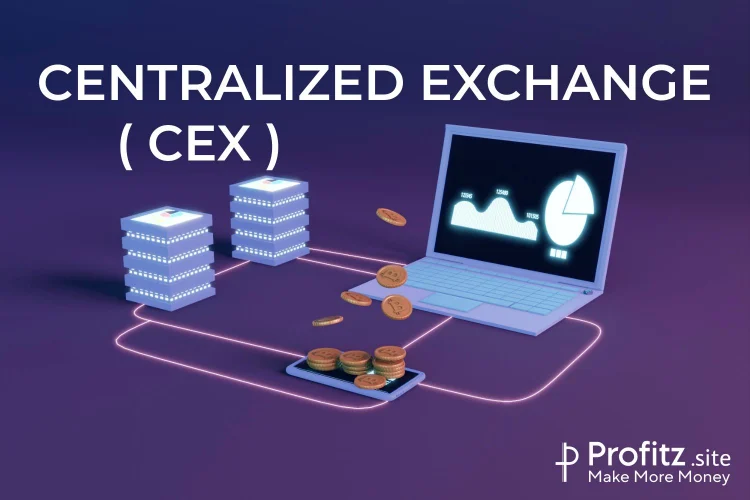What is a Centralized Exchange (CEX)?
Centralized Exchange (CEX), commonly known as CEX exchange, are digital platforms that act as intermediaries between buyers and sellers of cryptocurrencies. Unlike their decentralized counterparts, Centralized exchange (CEX) operate under the control of a central authority or company. They facilitate the exchange of various cryptocurrencies and fiat currencies, offering users a straightforward interface to trade, buy, or sell digital assets.
As a cryptocurrency exchange helps you to exchange Cryptocurrency pairs or Crypto- Fiat pairs- Crypto wallets helps you to store your Cryptocurrencies. For crypto wallets transaction fees is a crucial factor for selection.
Role of Centralized Exchange (CEX)
The fundamental mechanics of CEX involve users depositing their funds into accounts managed by the exchange. When a trade is initiated, the exchange matches buy and sell orders, executing transactions on behalf of the users. This centralized model allows for swift transactions and a wide array of trading pairs, contributing to the liquidity of the cryptocurrency market.
Centralized exchanges (CEX) differ from Decentralized exchanges (DEX) in the intermediary body. There’s no intermediary body in DEX.
Importance of CEX in the Cryptocurrency Ecosystem
CEXs play a pivotal role in the widespread adoption and growth of cryptocurrencies. They serve as entry points for newcomers venturing into the digital asset space, providing a familiar and user-friendly environment akin to traditional financial platforms.
The ease of use, accessibility, and variety of trading options offered by CEXs attract a broad spectrum of users, from individual retail investors to institutional traders.
Moreover, the liquidity provided by these centralized platforms is instrumental in maintaining market stability and facilitating price discovery for various cryptocurrencies. The high trading volumes on CEXs contribute significantly to the overall market activity, impacting the valuations and market dynamics of digital assets.

Key Features & Services Offered
1. Trading Pairs: CEX offers a wide array of trading pairs, allowing users to trade one cryptocurrency for another or for fiat currencies like USD, EUR, etc.
2. Order Types: Various order types such as market orders, limit orders, and stop-limit orders are commonly available.
3. Margin Trading & Lending: Some CEX platforms enable margin trading and lending, allowing users to borrow funds to amplify their trading positions.
4. APIs & Trading Tools: Many exchanges offer APIs and advanced trading tools for professional traders to implement automated trading strategies.
Liquidity and Trading Volume
Liquidity on CEX platforms refers to the ease with which assets can be bought or sold without causing significant price changes. Higher liquidity often correlates with larger trading volumes and narrower bid-ask spreads. CEX platforms with substantial liquidity tend to attract more traders and offer better opportunities for swift transactions.
Security Measures and Risks
1. Security Measures: CEX implement various security measures like two-factor authentication (2FA), cold storage for funds, encryption protocols, and regular security audits to safeguard user assets.
2. Risks: However, they are susceptible to hacking attempts due to their centralized nature. Incidents of hacking and unauthorized access have occurred in the past, leading to significant losses for users.

Advantages of Centralized Exchanges
Centralized exchanges (CEX) offer several advantages that contribute to their popularity among cryptocurrency traders and investors:
A. User-Friendly Interface and Accessibility
1. Simplified Trading: CEX platforms typically provide easy-to-understand trading interfaces, making it convenient for users to execute trades swiftly.
2. Accessible to Novices: The straightforward design of CEX platforms welcomes newcomers to the crypto space, facilitating their entry and understanding of trading processes.
B. High Liquidity and Trading Pairs
One of the most significant advantages of centralized exchanges is their high liquidity. They often host a wide array of cryptocurrencies, allowing users to access numerous trading pairs. This abundance of trading pairs ensures better market depth and increased opportunities for executing trades at desired prices.
1. Diverse Trading Options: CEXs host a vast selection of cryptocurrencies and trading pairs, enabling users to diversify their portfolios and explore various investment opportunities.
2. Immediate Execution: High liquidity ensures that orders can be executed promptly, reducing the risk of slippage and allowing traders to enter and exit positions swiftly.
C. Speed and Efficiency in Transactions
Centralized exchange platforms are known for their speed and efficiency in processing transactions. They utilize robust technological infrastructures that enable quick order matching and execution, facilitating rapid trades even during periods of high market activity.
1. Instant Order Execution: Transactions on centralized exchanges often occur in real-time or near real-time, providing users with quick execution of buy or sell orders.
2. Scalability and Performance: The advanced technology backing centralized exchanges allows for scalability, ensuring that the platform can handle a large number of transactions without compromising speed.
D. Support Services and Customer Assistance
Customer support is a crucial aspect of centralized exchanges. These platforms typically offer dedicated support services to address user queries, troubleshoot issues, and provide assistance promptly.
1. 24/7 Customer Support: Many CEXs offer round-the-clock customer support, ensuring users can seek assistance at any time, especially in the volatile crypto market.
2. Educational Resources: Some exchanges provide educational materials, tutorials, and FAQs to help users navigate the platform and understand various aspects of trading and investing in cryptocurrencies.
Challenges and Risks
A. Security Concerns: Hacking and Data Breaches
Centralized exchanges are prime targets for hackers due to the concentration of funds and sensitive information. Despite robust security measures, breaches have occurred, resulting in significant losses for users.
Instances of hacking and data breaches highlight the vulnerabilities inherent in storing large amounts of cryptocurrency in a single entity, leading to concerns regarding the safety of funds and personal information.
B. Centralization Risks: Control and Ownership
The centralized nature of these exchanges raises concerns about control and ownership. By centralizing control over assets and trading, users relinquish autonomy over their funds to a third party.
This creates a system where a single entity holds significant power over the flow and management of digital assets, potentially leading to issues like market manipulation, restrictions on transactions, or even insolvency.
C. Regulatory Scrutiny and Compliance
CEX platforms operate within a regulatory framework that often varies across jurisdictions. Meeting compliance standards and navigating evolving regulations can be challenging.
Regulatory changes or non-compliance issues can disrupt services, affect user access, and impose limitations on trading activities. Additionally, differing regulatory environments globally add complexity and uncertainty to the operations of centralized exchanges.
D. Dependency on Third Parties
Users trading on centralized exchanges rely heavily on the infrastructure and reliability of the platform. Any downtime, technical issues, or service disruptions could impede trading activities and access to funds.
Moreover, the dependency on third-party service providers, such as banking partners or technology providers, exposes users to potential risks arising from the performance or security lapses of these external entities.
Popular Centralized Exchanges
Trading Pairs | Supported Countries | Fiat Currencies | Trading Fees | Security Measures | Liquidity | Mobile App | |
| Changelly | 300+ | Worldwide | 40+ | Variable | SSL, 2FA | Moderate | Yes |
| CEX.IO | 200+ | Worldwide | USD, EUR, GBP | Variable | SSL, 2FA | Moderate | Yes |
| SimpleSwap | 300+ | Worldwide | 40+ | Variable | SSL, 2FA | Moderate | No |
| Coin Ledger | 1000+ | Varies | Varies | Variable | SSL, 2FA | – | No |
| Kraken | 150+ | Varies | USD, EUR, JPY | Variable | SSL, 2FA, Cold Storage | High | Yes |
| Bitfinex | 100+ | Varies | USD, EUR, JPY | Variable | SSL, 2FA, Cold Storage | High | Yes |
Strategies for Safe Trading on CEX
- Enable Two-Factor Authentication
- Set Secure Passwords
- Make Withdrawal white lists and Check email confirmations.
- Understanding CEX Platforms- reputation, history, and track record of different exchanges to choose a reliable platform.
- Reading User Reviews and Feedbacks
- Checking Supported Assets and Services which you use.
- Diversification: Spread investments across different assets can reduce risk exposure.
- Setting Investment Goals and Limits: Strategies for setting boundaries and diversifying investments based on risk tolerance and financial goals.
- Monitoring and Rebalancing: Regularly assessing the portfolio and adjusting asset allocation to maintain a balanced risk profile.
Innovations in CEX
Hybrid Models: Blending CEX and DEX (Decentralized Exchanges). Hybrid models aim to combine the speed, liquidity, and user experience of centralized exchanges with the security and control over funds typical of decentralized exchanges. This blend could provide a more robust and flexible trading environment for users, potentially addressing concerns related to security and ownership.
Regulatory compliance: Centralized exchanges points towards increased regulatory compliance, enhanced security measures, and greater integration of decentralized features.
Summary of CEX Exchange
Before concluding, I want to say about DEX. Decentralized exchanges offers highest security measures compared to CEX, since it operates on Blockchain & execution of smart contracts.
Centralized Exchanges (CEX) acts as gateways for users to buy, sell, and trade digital assets. These platforms offer convenience, high liquidity, and a wide range of services, catering to both novice and experienced traders. Provides User friendly interfaces.
Balancing Risks and Benefits in Using Centralized Exchanges
While CEX platforms offer numerous advantages, they are not without risks. The balance between convenience and security poses a challenge, as centralized exchanges are susceptible to hacking attempts, data breaches, and regulatory scrutiny.
You must weigh the benefits of liquidity and ease of use against the potential vulnerabilities and risks associated with entrusting their assets to third-party-controlled platforms.
There are smart ways to earn some FREE crypto coins such as Airdrops, ICOs, Bounty programs, Staking etc.
If you want learn & earn by trading Cryptocurrencies, you can learn in our profitz website – Practice more for overall success.
Share your thoughts in comments: What Centralized Exchange you are going to use & Why?
Happy Trading!
